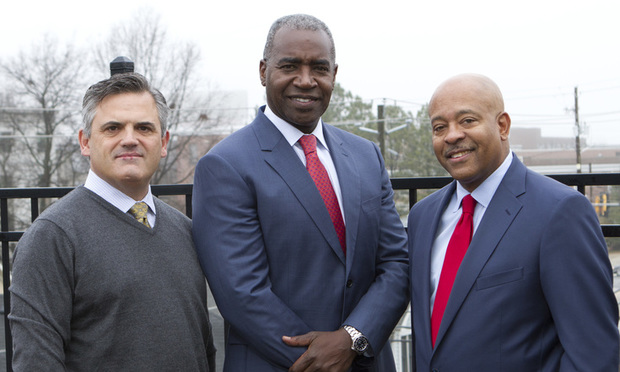Atlanta Firm Notches $3.4M Med-Mal Win in Virginia Trial
Edmond Lindsay & Atkins partner Bill Atkins said jurors in the fatal med-mal case were put off by defense arguments that made the circumstances surrounding the death of a young man "sound like it was no big deal."
February 01, 2019 at 02:10 PM
5 minute read
 William Atkins (from left), Roderick Edmond and Keith Lindsay of Edmond, Lindsay & Atkins, Atlanta. (Photo: John Disney/ALM)
William Atkins (from left), Roderick Edmond and Keith Lindsay of Edmond, Lindsay & Atkins, Atlanta. (Photo: John Disney/ALM)
A Virginia jury awarded more than $3.4 million to the estate of a young man who died when complications arose during an effort to remove a surgical band around his stomach that had become displaced.
“It's always interesting to try a case in somebody else's backyard,” said one of the winning lawyers, William Atkins of Atlanta's Edmond, Lindsay & Atkins.
“We were up against some of the most well-respected lawyers in Virginia,” said Atkins, who tried the case with partner Roderick Edmond. Brian Glass of Fairfax, Virginia's Marks & Glass served as local counsel.
The jury cleared Dr. Nicholas Tapazoglou, represented by James Knaack of Fairfax's Hancock, Daniel, Johnson & Nagle, of liability. But co-defendant Dr. Joyce Hairston, represented by Kristina Lewis of Fredericksburg's Mitchell Law Group, was found to be at fault.
Neither defense lawyer responded to requests for comment on Friday.
The case involved the 2015 death of 28-year-old Vincent Minor at Inova Fairfax Hospital.
Minor had recently moved from Douglasville, Georgia, to take a clerical job at a hospital.
“Ironically, his job was also at an lnova hospital,” Atkins said.
“He was a wonderful young man; he had a beautiful voice and led the singing at worship services at his church,” he said.
According to a synopsis of the case, in 2009 Minor had undergone gastric bypass surgery, which involves placing a “lap band” around the stomach to effectively reduce the amount of food it can hold.
In February 2015 Minor, who then weighed more than 300 pounds, went to the Fairfax hospital's emergency room complaining of stomach pain, nausea and difficulty swallowing.
A CT scan revealed that the lap band had slipped and that Minor had a herniated stomach and “massively dilated esophagus.”
Minor was scheduled for surgery two days later.
As Minor was being anesthetized, he vomited what the plaintiff's filings said was a “copious” amount of gastric content, inhaling some of the matter.
The surgery went forward but halted when Minor was taken to the intensive care unit for a bronchoscopy, which revealed gastric content in his trachea, airway and lungs.
Minor never came around; he stayed on a ventilator for more than a month before his parents had it disconnected.
In 2017, the administrator of Minor's estate filed a medical-malpractice suit in Fairfax County Circuit Court against multiple defendants, including anesthesiologist Hairston and her practice; surgeon Tapazoglou and his practice; the attending nurse; and Inova Health Care Services.
By the time the case went to trial, only the doctors remained as defendants.
Atkins said there were “zero offers” from the remaining defendants to settle the case, and they had no interest in any discussions or mediations.
During a 2½ week trial before Judge Michael Devine, Atkins said the plaintiff's case centered on two arguments.
“Our primary standard of care issue was that they should have emptied his stomach and esophagus before the surgery,” he said. “But our second argument was that they should have stopped the procedure once he started vomiting.”
The defense also had two arguments, he said.
“First, they said the standard of care did not require the placement of a nasogastric tube when inducing rapid-sequence induction,” he said, describing that as a type of anesthesia in which both a sedative and muscle relaxer are administered at the same time, rendering a patient unconscious within 30 to 90 seconds.
“They also said that this was such an unusual event and that everyone thought he should have recovered,” he said.
Each side provided testimony from multiple experts, he said.
The jury deliberated for 10 hours over two days before finding Hairston liable for negligence, awarding $3,401,451 dollars in damages, plus accrued interest on more than $400,000 in medical and funeral expenses.
In conversation with jurors afterward, Atkins said their decision “ultimately turned on the fact that the defense really undersold the event, and made it sound like it was no big deal. We had two experts who said it was one of the worst they'd seen.
This content has been archived. It is available through our partners, LexisNexis® and Bloomberg Law.
To view this content, please continue to their sites.
Not a Lexis Subscriber?
Subscribe Now
Not a Bloomberg Law Subscriber?
Subscribe Now
NOT FOR REPRINT
© 2025 ALM Global, LLC, All Rights Reserved. Request academic re-use from www.copyright.com. All other uses, submit a request to [email protected]. For more information visit Asset & Logo Licensing.
You Might Like
View All

Upcoming Changes to Medicare Secondary Payer Reporting: What WC Insurers and Attorneys Need to Know
5 minute read
Biden Administration Tells Justices That Bans on Gender Care Are Sex Discrimination

11th Circuit Allows Florida Transgender Health Care Ban to Continue Pending Full Appeal on Constitutionality of Law
Trending Stories
- 1Kraken’s Chief Legal Officer Exits, Eyes Role in Trump Administration
- 2DOT Nominee Duffy Pledges Safety, Faster Infrastructure Spending in Confirmation Hearing
- 3'Younger and Invigorated Bench': Biden's Legacy in New Jersey Federal Court
- 4'Every Single Judge on Board': First-Impression Case Revived
- 5NYSBA Annual Meeting: How In-House Counsel Navigate Gen AI Risk
Who Got The Work
J. Brugh Lower of Gibbons has entered an appearance for industrial equipment supplier Devco Corporation in a pending trademark infringement lawsuit. The suit, accusing the defendant of selling knock-off Graco products, was filed Dec. 18 in New Jersey District Court by Rivkin Radler on behalf of Graco Inc. and Graco Minnesota. The case, assigned to U.S. District Judge Zahid N. Quraishi, is 3:24-cv-11294, Graco Inc. et al v. Devco Corporation.
Who Got The Work
Rebecca Maller-Stein and Kent A. Yalowitz of Arnold & Porter Kaye Scholer have entered their appearances for Hanaco Venture Capital and its executives, Lior Prosor and David Frankel, in a pending securities lawsuit. The action, filed on Dec. 24 in New York Southern District Court by Zell, Aron & Co. on behalf of Goldeneye Advisors, accuses the defendants of negligently and fraudulently managing the plaintiff's $1 million investment. The case, assigned to U.S. District Judge Vernon S. Broderick, is 1:24-cv-09918, Goldeneye Advisors, LLC v. Hanaco Venture Capital, Ltd. et al.
Who Got The Work
Attorneys from A&O Shearman has stepped in as defense counsel for Toronto-Dominion Bank and other defendants in a pending securities class action. The suit, filed Dec. 11 in New York Southern District Court by Bleichmar Fonti & Auld, accuses the defendants of concealing the bank's 'pervasive' deficiencies in regards to its compliance with the Bank Secrecy Act and the quality of its anti-money laundering controls. The case, assigned to U.S. District Judge Arun Subramanian, is 1:24-cv-09445, Gonzalez v. The Toronto-Dominion Bank et al.
Who Got The Work
Crown Castle International, a Pennsylvania company providing shared communications infrastructure, has turned to Luke D. Wolf of Gordon Rees Scully Mansukhani to fend off a pending breach-of-contract lawsuit. The court action, filed Nov. 25 in Michigan Eastern District Court by Hooper Hathaway PC on behalf of The Town Residences LLC, accuses Crown Castle of failing to transfer approximately $30,000 in utility payments from T-Mobile in breach of a roof-top lease and assignment agreement. The case, assigned to U.S. District Judge Susan K. Declercq, is 2:24-cv-13131, The Town Residences LLC v. T-Mobile US, Inc. et al.
Who Got The Work
Wilfred P. Coronato and Daniel M. Schwartz of McCarter & English have stepped in as defense counsel to Electrolux Home Products Inc. in a pending product liability lawsuit. The court action, filed Nov. 26 in New York Eastern District Court by Poulos Lopiccolo PC and Nagel Rice LLP on behalf of David Stern, alleges that the defendant's refrigerators’ drawers and shelving repeatedly break and fall apart within months after purchase. The case, assigned to U.S. District Judge Joan M. Azrack, is 2:24-cv-08204, Stern v. Electrolux Home Products, Inc.
Featured Firms
Law Offices of Gary Martin Hays & Associates, P.C.
(470) 294-1674
Law Offices of Mark E. Salomone
(857) 444-6468
Smith & Hassler
(713) 739-1250






